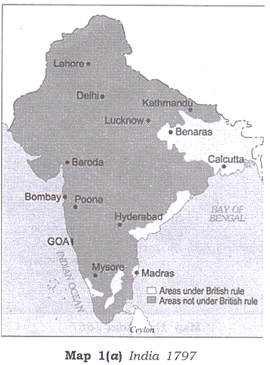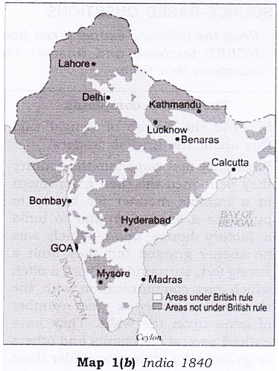CBSE Class 8 History Chapter 2 Important Questions. myCBSEguide has just released Chapter Wise Question Answers for class 8 Social Science. There chapter wise Practice Questions with complete solutions are available for download in myCBSEguide website and mobile app. These Extra Questions with solution are prepared by our team of expert teachers who are teaching grade in CBSE schools for years. There are around 4-5 set of solved History Extra questions from each and every chapter. The students will not miss any concept in these Chapter wise question that are specially designed to tackle Exam. We have taken care of every single concept given in CBSE Class 8 Social Science syllabus and questions are framed as per the latest marking scheme and blue print issued by CBSE for Class 8.
CBSE Class 8 History Practice Questions
From Trade to Territory The Company Establishes Power Class 8 Extra Questions
Ch-2 From Trade to Territory The Company Establishes Power
-
According to the historians, by the second half of the 18th century, which new power emerged as powerful in India?
-
Chinese
-
Dutch
-
British
-
Japanese
-
-
Name the place the British King Charles-II received as a dowry by marrying the Portuguese princess, which later became an important trading centre.
-
Island of Bombay
-
Island of Pondicherry
-
Island of Goa
-
Island of Kuchch
-
-
From the years mentioned below, choose the correct date of death of Aurangzeb, the Mughal ruler
-
On 3rd March 1800
-
On 3rd March 1850
-
On 3rd March 1707
-
On 3rd March 1750
-
-
What was farman?
-
It was a royal order.
-
It was a royal food.
-
It was a royal procession.
-
It was a royal dress.
-
-
Subsidiary Alliance was introduced by ________
-
Lord Mountbatten
-
Lord Wellesley
-
Robert Clive
-
William Bentick
-
-
Match the following:
i. Sipahi (a) 1757 ii. Tipu Sultan (b) Tiger of Mysore iii. Battle of Plassey (c) Sepoy iv. Lord Dalhousie (d) Doctrine of Lapse -
- The Bengal Nawabs asserted their power and autonomy after the death of ……….
- The principal figure in an Indian district was the ……….
- The Company took over Awadh in the year ………
-
True or False:
- Robert Clive was appointed Governor of Bengal in 1764.
- Aurangzeb died in 1706.
- Mir Jafar was the puppet in the hands of Britishers.
- The Battle of Panipat was the first major victory for Britishers.
-
What happened in the Battle of Seringapatam?
-
What do you mean by Dharmashastra?
-
What caused huge loss of revenue in Bengal?
-
On outline maps of India show expansion of British territorial power in India.
-
Write a note one on Tipu Sultan – The ‘Tiger of Mysore’.
Ch-2 From Trade to Territory The Company Establishes Power
Answer
-
- British, Explanation: By the second half of the eighteenth century, however, a new power was emerging on the political horizon – the British. The British originally came as a small trading company and were reluctant to acquire territories.
- Island of Bombay, Explanation: Catherine of Braganza (25 November 1638 – 31 December 1705) was Queen of England, Scotland and Ireland from 1662 to 1685, by marriage to King Charles II.Catherine’s marriage had an important result for the later history of India and of the British Empire, though the Queen personally had little to do with it: soon after acquiring the Seven Islands of Bombay as part of her dowry, Charles II rented them to the East India Company which moved its Presidency there, resulting in Bombay eventually growing to become one of the main cities of India.
- On 3rd March 1707, Explanation: Aurangzeb was the sixth emperor of the Mughal Empire. He ruled over most of the Indian subcontinent. His reign lasted for 49 years from 1658 until his death in 3 March 1707. During this time, Aurangzeb greatly expanded the territory of the Mughal Empire. He was constantly at war. Victories in the south expanded the Empire to more than 3.2 million square kilometres. He was the last great ruler of the Mughal dynasty. After his death, the power of the Mughal Empire declined quickly.
- It was a royal order, Explanation: A Farman is a royal edict or a royal order. For example; Aurangzeb’s farman, for instance, had granted only the Company the right to trade duty free.
- Lord Wellesley, Explanation: Subsidiary Alliance was framed by Lord Wellesley, British Governor-General in India from 1798 to 1805. Early in his governorship, Wellesley adopted a policy of non-intervention in the princely states, but he later adopted the policy of forming subsidiary alliances, which played a major role in the expansion of British rule in India.
- Sipahi – (c) Sepoy
- Tipu Sultan – (b) Tiger of Mysore
- Battle of Plassey – (a) 1757
- Lord Dalhousie – (d) Doctrine of Lapse
- Aurangzeb
- Collector
- 1856
- True
- False
- True
- False
- Tipu Sultan was killed defending his capital seringapatam.
- Dharmashastra refers to Sanskrit texts prescribing social rules and codes of behaviour, composed from 500 BCE onwards.
- Aurangzeb’s farman had granted the company only the right to trade duty free. But the officials of the company, who were carrying on private trade on side, also stopped paying duty. This caused a huge loss of revenue for Bengal.


-
- Tipu Sultan was the famous ruler of Mysore. He ruled Mysore from 1782 to 1799. Under his leadership, Mysore becomes very powerful.
- It controlled the profitable trade of the Malabar coast where the company purchased pepper and cardamom. In 1785 Tipu Sultan stopped the export of these items through the ports of his kingdom and disallowed local merchants from trading with the company.
- He also developed relations with the French in India to modernize his army with their help. The British got furious.
- They waged four battle against Tipu sultan. The last battle proved unfortunate for him. He was killed defending his capital Seringapatam. The way he resisted the British is undoubtedly praiseworthy.
Chapter Wise Extra Questions for Class 8 Social Science

Test Generator
Create question paper PDF and online tests with your own name & logo in minutes.
Create Now
Learn8 App
Practice unlimited questions for Entrance tests & government job exams at ₹99 only
Install Now